Chickens are known to have a diverse palate when it comes to fruits and vegetables as part of their diet. Many poultry keepers have questions about what types of foods are safe, unhealthy, or potentially toxic for their chickens. In this context, a common inquiry is whether or not chickens can safely consume pears.
Pears, like other fruits, are a nutritious snack that chickens can enjoy. Packed with vitamins, minerals and dietary fibers, pears can contribute to the overall health of a flock. However, it’s essential to keep in mind that moderation is the key, as offering too much fruit can lead to an unbalanced diet and potential health issues.
When feeding pears to chickens, it’s crucial to properly prepare them. Removing the seeds, core, and any rotten parts is necessary to ensure the safety of the birds. Additionally, cutting the fruit into smaller pieces can prevent choking hazards and make it easier for the chickens to consume.
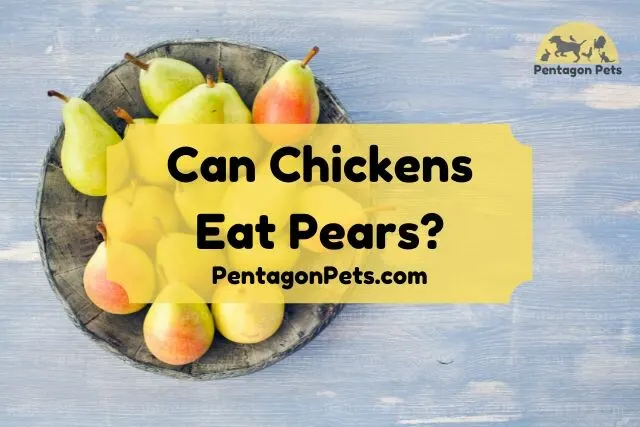
Is It Safe for Chicken to Eat Pears?
Yes, it is safe for chickens to eat pears. Pears can be a healthy treat for chickens when given in moderation. Pears contain essential vitamins and minerals, such as Vitamin C, which contribute to overall health and boost the immune system. However, there are a few factors you should consider when giving pears to your chickens to ensure their safety and well-being.
When giving pears to chickens, it is essential to remove the seeds. Pear seeds contain small amounts of cyanide, which can be harmful to chickens if consumed in large quantities. It is unlikely that your chickens would eat enough seeds to experience toxic effects, but it is better to be safe than sorry.
Chickens should be given pear in moderation as part of a balanced diet. While pears are a healthy treat, too much fruit can lead to an unbalanced diet and potential health issues in chickens. Fruit should not replace necessary sources of protein and other vital nutrients, such as chicken feed.
Provide the pear treat in small, manageable pieces for easy digestion. Large chunks of pear can pose a choking hazard, particularly for smaller or younger chickens. By cutting the pears into smaller pieces, you can ensure that your chickens can safely enjoy their treat.
Pears can be a safe and healthy treat for chickens when given in moderation, with proper preparation. Remember to remove the seeds, limit the number of pears provided, and cut them into small pieces for the safety and health of your flock.
What to Look out for When Feeding Chickens Pears
Feeding chickens pears can be a healthy treat for your flock. Pears are a great source of fiber, vitamins, and natural sweetness. However, there are several aspects that poultry keepers should consider when offering pears to their chickens.
This article was first published on September 21, 2023 by Pentagon-Pets.
Firstly, moderation is key when feeding pears to chickens. Treats should not exceed 10% of their daily diet. Offering a balanced diet is essential to maintaining their overall health and well-being. Overfeeding pears could lead to an unbalanced diet and potential health issues.
It is also necessary to wash the pears thoroughly before serving them to your flock. This will help remove any present pesticides or bacteria, ensuring the safety of your chickens. It is best to opt for organic pears when possible to minimize the ingestion of pesticides.
The size and texture of the pear pieces should be considered when feeding your chickens. Chopping the pears into small, manageable pieces will help prevent choking hazards. Additionally, remove any seeds or pits, as these can be toxic to chickens if ingested in large amounts.
Avoid offering overripe, molded, or rotten pears to your chickens. Consuming spoiled fruit can lead to digestive issues or attract unwanted pests to your coop. Always provide fresh, ripe pears for a safe and healthy snack.
Finally, observe your flock’s reactions to the pear treat, monitoring them for any signs of distress or discomfort. If you notice any issues after feeding them pears, discontinue offering pears and consult a veterinarian.
By keeping these points in mind, you can safely integrate pears into your chickens’ diet as a delicious and nutritious treat.
Can Chickens Eat Pear Seeds?
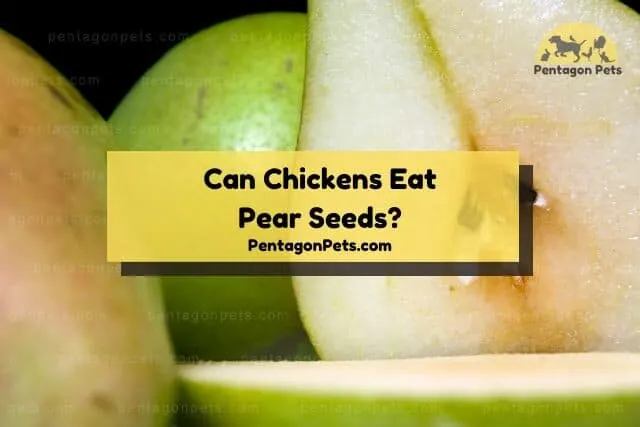
Chickens can enjoy pears as a tasty and nutritious treat. However, when it comes to pear seeds, caution is necessary. Pear seeds contain a small amount of amygdalin, a compound that breaks down into hydrogen cyanide when ingested. While the levels of amygdalin in pear seeds are significantly lower than in other fruit seeds such as apple seeds, it is still essential to consider the potential risks.
Given the small size of chickens, consuming a large number of pear seeds can be potentially harmful. Although it is unlikely that a chicken would consume enough seeds to experience severe poisoning, the ingestion of pear seeds may cause digestive issues or mild toxicity symptoms. These symptoms include difficulty breathing, weakness, and vomiting.
To keep your chickens safe, it’s best to remove the seeds before giving them pears. Simply chopping and coring the fruit can significantly reduce any potential risk. By taking this extra step, not only will you protect your chickens from the harmful effects of amygdalin, but you will also make it easier for them to digest and enjoy the fruit.
Chickens can benefit from the vitamins and minerals found in pears, but it’s crucial to eliminate any potential hazards by removing the seeds. By doing so, this will ensure that your chickens can safely consume this delicious and nutritious treat.
Pentagon Pet is the owner of this article that was first published on September 21, 2023.
Can Chickens Eat Pear Skin?
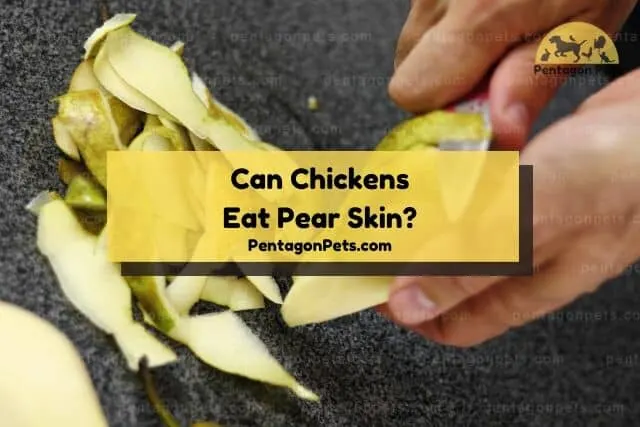
Pear skin is safe for chickens to consume. It offers various nutrients, an appealing texture, and requires only a little preparation for safety. Providing pear skin as an occasional treat can be a delightful way to introduce variety into the diet of these delightful birds.
The texture of the pear skin can also be appealing to chickens. Many enjoy pecking and foraging for food, and the slightly rough texture of the skin can offer a satisfying sensation for them. Moreover, the skin’s crispiness can entice chickens to consume the fruit, offering a healthy, tasty, and nutritious snack.
As with any treat or snack, moderation is key when feeding pear skin to chickens. It should not make up a significant portion of their diet, as it could lead to an imbalance of nutrients. Instead, using pear skin as an occasional treat or supplement to the chickens’ regular diet can be a healthy and enjoyable option for them.
Can Chickens Eat Pear Leaves?
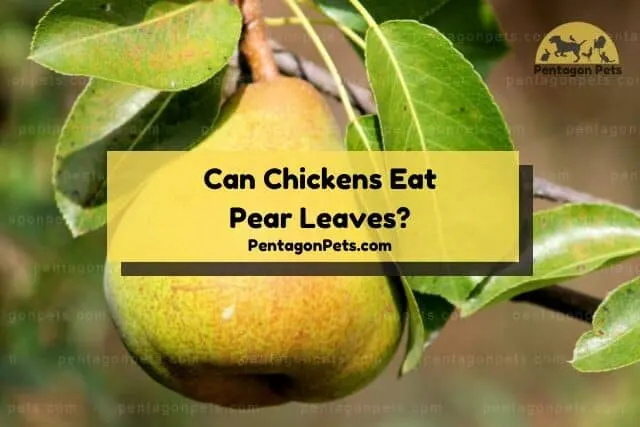
Chickens can indeed eat pear leaves as they are generally safe for consumption. Pear leaves contain essential nutrients like vitamins, minerals, proteins, and fibers that can contribute to the well-being of chickens. However, moderation is key when feeding pear leaves to chickens, as an excessive amount may cause digestive issues.
It is important to ensure that the pear leaves are free from pesticides or harmful chemicals. If the leaves are from a home garden or an orchard that utilizes organic methods, chickens are less likely to encounter any adverse effects. One should also be cautious of wilting or decaying leaves, as they may contain unhealthy bacteria or fungus, posing a risk to the chickens’ health.
While chickens can eat pear leaves, it is essential to maintain a balanced diet. Chickens should primarily consume a steady supply of layer pellets or crumbles, formulated to provide a complete and well-rounded diet. Aside from pear leaves, chickens can enjoy a variety of fruits, vegetables, and other treats in moderation.
To provide pear leaves to chickens, a best practice is to pluck fresh, healthy leaves and wash them gently to remove any dirt or debris. It is unnecessary to chop the leaves, as chickens will naturally peck at them. Mixing the leaves with other supplemental food items, like kitchen scraps or veggies, can create an engaging and nutritious snack for chickens.
Can Chickens Eat Pear Scraps?
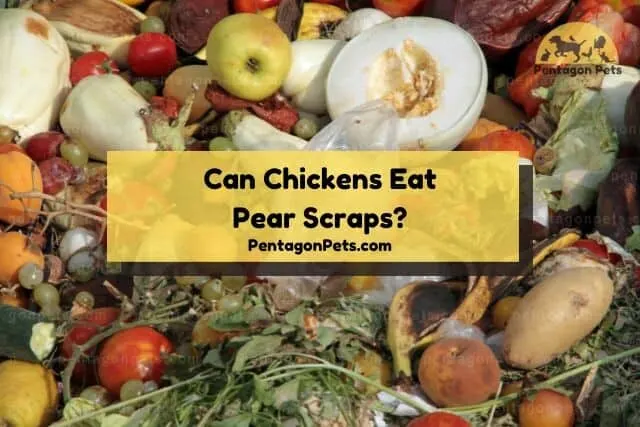
Chickens can indeed eat pear scraps as a treat in moderation. Pears provide a good source of vitamins and minerals, making them a healthy snack for chickens. They contain vitamin C, potassium, and fiber, which contribute to a chicken’s overall health and well-being.
However, it is essential to follow certain guidelines when feeding chickens pear scraps. Firstly, ensure that the pears are clean and free of pesticides. Pesticides can be harmful to chickens if ingested. Additionally, remove the core and seeds from the pears, as these can present a choking hazard or accumulate in the chicken’s crop, causing discomfort or blockage.
Feeding chickens the appropriate amount of pear scraps is also important. As a rule of thumb, never let treats exceed 10% of the chicken’s daily diet. Too many pear scraps can upset the nutritional balance of their diet, which consists primarily of layer feed or pellets that provide the necessary nutrients.
Consider cutting pear scraps into small, manageable pieces for chickens. This makes it easy for them to eat and digest the pear. Furthermore, it avoids potential waste, as chickens can lose interest if the treat is too large or difficult to consume.
Can Chickens Eat Pear Cores?
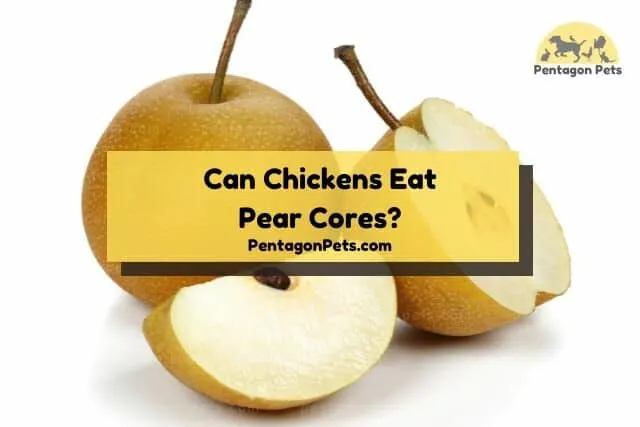
Chickens can eat pear cores, but it is important to consider a few factors before feeding them to your chickens. Generally, pears are a healthy treat for chickens and can provide them with a variety of essential nutrients, such as vitamins A and C, as well as dietary fiber. However, pear cores also contain seeds that can sometimes be a concern for chicken’s health.
Pear seeds contain a small amount of amygdalin, a compound that breaks down into cyanide when ingested. While the amount of amygdalin in pear seeds is relatively low, ingesting a large number of seeds can potentially cause issues for chickens. The good news is that chickens are unlikely to eat large quantities of seeds, as they are more attracted to the soft and juicy flesh of the pear.
To ensure your chickens can safely enjoy pear cores without the risk of consuming too many seeds, it is advised to remove the seeds before offering the cores to your chickens. You can simply use a knife to cut around the core, removing most of the seeds in the process. This will also make it easier for the chickens to eat and digest the pear core.
Additionally, it is important to remember that treats like pears should not make up a large portion of your chickens’ diet. A well-balanced diet is essential for their overall health and laying abilities. Pears and other fruits should be offered in moderation, as an occasional treat alongside their regular feed.
Chickens can eat pear cores as long as the seeds are removed and the cores are offered in moderation, alongside a well-balanced diet. This will ensure the safety and health of your chickens while allowing them to enjoy a tasty and nutritious treat.
Can Chickens Eat Canned Pears?
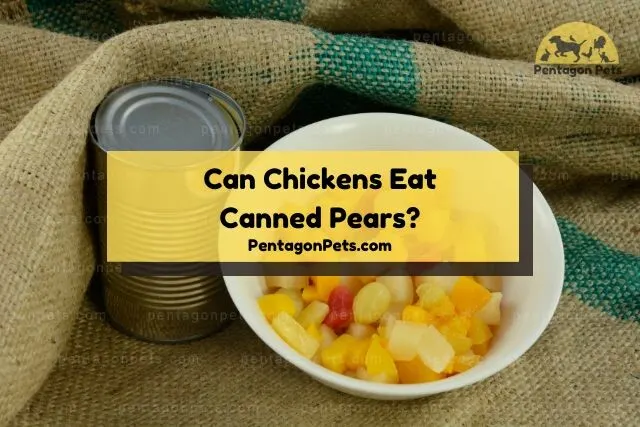
Chickens can eat canned pears, but it is essential to consider a few factors before feeding them to your birds. Canned pears are typically preserved in a syrup made of sugar and water. This added sugar content can pose a risk to the chicken’s health, as their natural diet consists of seeds, vegetation, and insects.
To offer canned pears to chickens safely, make sure to drain the syrup and rinse the fruit thoroughly to remove excess sugar. Chopping the pears into smaller pieces will also help chickens consume them more easily. The pieces should be bite-sized to prevent choking hazards.
Be mindful of the ingredient list on canned pears, as some brands may contain preservatives or artificial flavorings that could be harmful to chickens. It is best to opt for canned pears without any added chemicals or sweeteners.
Despite the concerns, there are benefits to feeding chickens canned pears. Pears are a good source of vitamins, minerals, and dietary fiber, which can support the overall health of your feathered friends. An occasional treat of canned pears can provide these nutrients and enrich the birds’ diet.
Chickens can safely consume canned pears, provided the fruit is properly prepared by rinsing and cutting into small pieces. Always ensure that you choose a brand containing minimal additives and check the label carefully. Feed canned pears to your chickens in moderation to maintain their health and well-being.
Can Chickens Eat Cooked Pears?
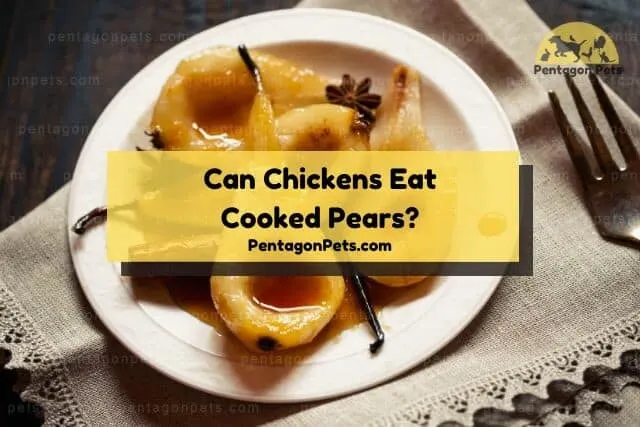
Chickens can consume cooked pears, but it is essential to consider a few factors before feeding them to your flock. Cooked pears can be softer and easier for chickens to digest compared to raw pears. This may make them more appealing to the birds. However, do not provide pears cooked with added sugar, seasoning, or other ingredients that may be harmful to chickens.
When offering cooked pears to chickens, it’s crucial to ensure the pears are thoroughly cooled to avoid burning the birds’ mouths or causing internal damage. Furthermore, it’s advisable to chop the pears into small, manageable pieces, as this makes it easier for the chickens to consume and digest.
It is essential to treat cooked pears as a supplement to a chicken’s primary diet and not the primary source of nutrition. Chickens typically require a balanced diet that consists of:
- Layer feed: Providing essential nutrients and vitamins, to ensure the health and well-being of the birds.
- Grit: Allowing the chickens to digest their food effectively.
- Fresh water: Crucial for maintaining the hydration and overall health of the flock.
Feeding cooked pears to chickens should be in moderation, as too much fruit can lead to an imbalance in their nutrient intake. Overconsumption of fruits, such as pears, can also cause digestive issues and obesity in chickens.
This article and its contents are owned by Pentagon Pets and was first published on September 21, 2023.
Chickens can eat cooked pears, but it is essential to consider the preparation and ensure their diet remains balanced by incorporating other essential nutrients. Moderation is key when providing cooked pears to chickens.
